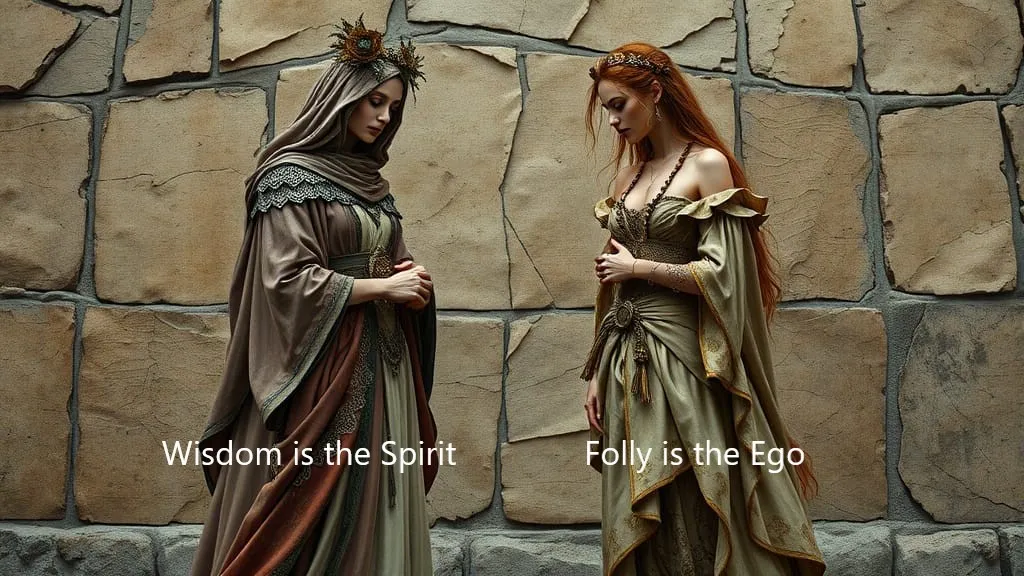Men read the Book of Proverbs and think they have found the Bible's self-help section. They see it as a collection of divine life-hacks, a moralistic instruction manual for how to be a successful, respectable, and prosperous person. They turn it into a checklist for the ego's self-improvement project. This is a deadly and complete misreading.

The Book of Proverbs is not a "how-to" guide for becoming wise. It is a divine field guide for identifying two opposing states of consciousness that are at war within you: Wisdom and Folly. It does not teach you how to be; it describes what is.
1. Wisdom is the Spirit; Folly is the Ego
The entire book is a personification of these two forces.
Lady Wisdom is not a clever concept. She is the Holy Spirit, the Logos, the divine principle of order and reality. She is the "Teacher within." She is not something you learn; she is someone you listen to. This is why she "cries out in the public square" (Proverbs 1:20), but the ego is too busy with its own noise to hear her. She existed before creation: "The Lord brought me forth as the first of his works, before his deeds of old." (Proverbs 8:22). She is the very mind of God, which you can access only when your own mind is silent.
Lady Folly, the "adulterous woman," is not just a warning against sexual temptation. She is the personification of the ego. She is the voice in your head that promises pleasure, excitement, and fulfillment through secret, forbidden means. "Stolen water is sweet; food eaten in secret is delicious!" (Proverbs 9:17). But her house is the path to the grave. To follow her is to be seduced by your own thoughts, your own desires, your own passions. It is the path to spiritual death.
2. "The Fear of the Lord" is the Beginning of Sanity
The most famous verse, "The fear of the Lord is the beginning of wisdom," (Proverbs 9:10) is not about being terrified of a cosmic tyrant. "Fear" in this context means awe, respect, the moment of profound humility. It is the beginning of wisdom because it is the first moment the ego realizes it is not God. It is the dawn of the awareness that there is a reality, an intelligence, and a power infinitely greater than its own petty schemes. It is the prerequisite for surrender. Without this "fear," the ego remains on the throne, convinced of its own supremacy.
3. The Proverbs are Descriptions, Not Prescriptions
The practical proverbs "Lazy hands make for poverty, but diligent hands bring wealth" (Proverbs 10:4) are not moral commands to work hard so that God will bless you. That is the ego's transactional religion.
This is a statement of spiritual physics. A consciousness that is aligned with Wisdom (the Spirit) is naturally orderly, focused, and diligent. The "wealth" it brings is primarily spiritual peace and wholeness, which often manifests in the physical world. A consciousness ruled by Folly (the ego) is naturally chaotic, scattered, and lazy. It produces spiritual "poverty" and misery, which also manifests externally.
The action is the fruit of the inner state, not the cause of it. The religious man reads this and thinks, "I must be diligent to please God." This is the ego trying to work its way to righteousness. The spiritual man understands, "I must surrender to Wisdom, and then my hands will become diligent as a natural consequence of my new nature."
Proverbs is a binary choice. It is a mirror. It shows you the nature of the two voices constantly vying for control of your mind. It does not give you a ten-step plan to become wise. It tells you to shut up, be still, and listen to the Wisdom that is already there, and to mercilessly ignore the seductive voice of the Folly that leads to death.